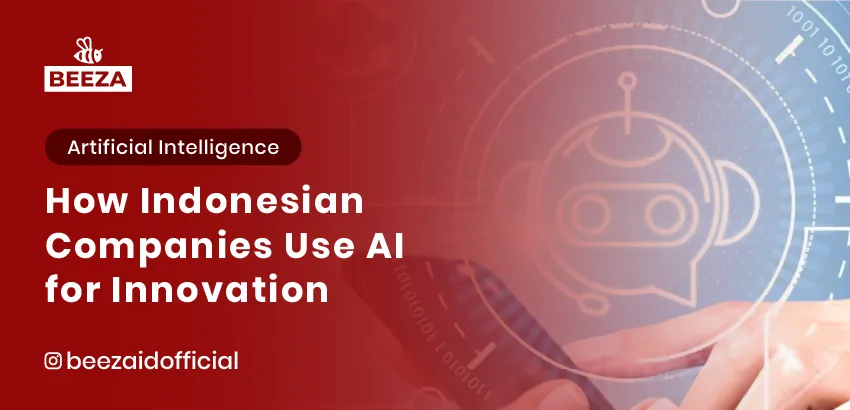
Introduction
Artificial Intelligence (AI) is transforming industries across the globe, and Indonesia is no exception. As companies strive to improve efficiency, security, and customer experience, AI has become a crucial tool in digital transformation. Businesses are now using AI to automate processes, analyze vast amounts of data, enhance fraud detection, and personalize services—leading to faster operations, cost savings, and improved decision-making.
Several key industries in Indonesia, including financial services, e-commerce, manufacturing, and healthcare, are at the forefront of AI adoption. Companies in these sectors leverage AI-powered tools to stay competitive, increase revenue, and deliver better user experiences.
In this article, we will explore how Indonesian companies are utilizing AI for innovation and the tangible benefits they have achieved.
1. AI in Fintech: Enhancing Financial Services
The financial sector has been one of the earliest adopters of AI due to its ability to handle large datasets, detect anomalies, and automate decision-making. With the rise of digital banking, AI has become a game-changer in improving security, risk management, and customer engagement.
📌 Case Study: Bank Jago
Bank Jago, one of Indonesia’s leading digital banks, uses AI extensively to improve banking services and security. Key AI-driven solutions include:
✅ AI-powered chatbots that offer 24/7 customer service, handling inquiries quickly and efficiently.
✅ Automated credit risk assessments, analyzing customer data to determine loan eligibility with better accuracy.
✅ Fraud detection systems, leveraging AI algorithms to identify suspicious transactions in real time.
🔹 Outcome: By implementing AI, Bank Jago has improved customer satisfaction, reduced financial fraud, and streamlined loan approval processes, making banking more accessible and secure.
2. AI in E-Commerce: Personalizing Shopping Experiences
E-commerce platforms rely on AI to enhance customer experiences, optimize inventory management, and prevent fraudulent activities. AI plays a vital role in recommendation systems, chatbots, and dynamic pricing strategies, helping businesses maximize sales and engagement.
📌 Case Study: Tokopedia
Tokopedia, one of Indonesia’s largest e-commerce platforms, has integrated AI into multiple aspects of its operations:
✅ Personalized product recommendations, where AI analyzes browsing and purchase history to suggest relevant items.
✅ AI-powered chatbots, allowing quick responses to customer inquiries and support requests.
✅ Fraud prevention systems, detecting abnormal buying patterns and securing transactions.
🔹 Outcome: AI has enabled Tokopedia to provide a seamless and engaging shopping experience while reducing fraudulent transactions and enhancing customer retention.
3. AI in Manufacturing: Improving Production Efficiency
The manufacturing industry is using AI to automate quality control, optimize production lines, and predict equipment failures before they happen. AI-driven solutions help companies minimize downtime, reduce waste, and improve product consistency.
📌 Case Study: Astra International
Astra International, a major player in Indonesia’s manufacturing sector, has successfully integrated AI to boost operational efficiency. Some key implementations include:
✅ Predictive maintenance, using AI to analyze machine performance data and identify potential failures before they occur.
✅ Automated quality control, leveraging computer vision to inspect products and detect defects in real time.
✅ Supply chain optimization, where AI predicts demand trends and helps maintain the right inventory levels.
🔹 Outcome: AI has helped Astra reduce production costs, enhance product quality, and increase operational reliability, positioning it as a leader in smart manufacturing.
4. AI in Healthcare: Revolutionizing Telemedicine
The healthcare sector is leveraging AI to improve diagnostics, enhance patient care, and streamline administrative processes. AI-driven solutions help doctors make better decisions, automate repetitive tasks, and provide faster, more accurate medical services.
📌 Case Study: Halodoc
Halodoc, Indonesia’s top telemedicine platform, is using AI to enhance digital healthcare services in several ways:
✅ AI-driven symptom checker, allowing users to input symptoms and receive preliminary diagnoses or medical recommendations.
✅ AI-assisted diagnostics, analyzing medical images and patient records to assist doctors in detecting diseases earlier.
✅ Automated prescription analysis, helping ensure safe drug interactions and proper medication recommendations.
🔹 Outcome: AI has allowed Halodoc to provide accessible and reliable healthcare solutions, reducing patient wait times and improving diagnostic accuracy.
Future of AI in Indonesia
As AI technology continues to evolve, businesses across different industries in Indonesia will benefit from further advancements. Some key areas to watch include:
➡ Smart cities: AI will play a significant role in urban development, optimizing traffic management and public safety.
➡ Agriculture: AI-powered drones and sensors will improve crop monitoring, pest detection, and yield predictions.
➡ Banking and finance: AI-driven automation will continue to enhance fraud detection, investment recommendations, and digital banking services.
The adoption of AI will accelerate digital transformation in Indonesia, helping businesses stay competitive, reduce costs, and deliver better services.
Conclusion
AI is no longer just an emerging trend—it is a necessity for businesses looking to innovate and thrive in the digital era. Indonesian companies in fintech, e-commerce, manufacturing, and healthcare are already leveraging AI to achieve greater efficiency, security, and customer satisfaction.
Does your business need AI-powered solutions? Beeza provides cutting-edge AI integration services tailored to your industry.
📩 Contact Beeza for a consultation today!